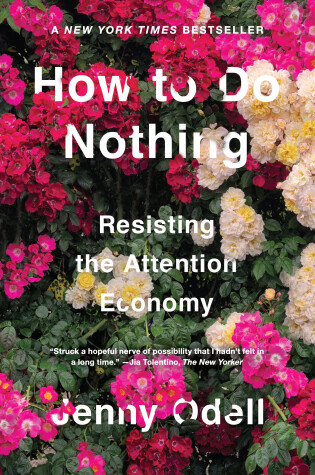
** A New York Times Bestseller **
NAMED ONE OF THE BEST BOOKS OF THE YEAR BY: Time • The New Yorker • NPR • GQ • Elle • Vulture • Fortune • Boing Boing • The Irish Times • The New York Public Library • The Brooklyn Public Library
"A complex, smart and ambitious book that at first reads like a self-help manual, then blossoms into a wide-ranging political manifesto."—Jonah Engel Bromwich, The New York Times Book Review
One of President Barack Obama's "Favorite Books of 2019"
Porchlight's Personal Development & Human Behavior Book of the Year
In a world where addictive technology is designed to buy and sell our attention, and our value is determined by our 24/7 data productivity, it can seem impossible to escape. But in this inspiring field guide to dropping out of the attention economy, artist and critic Jenny Odell shows us how we can still win back our lives.
Odell sees our attention as the most precious—and overdrawn—resource we have. And we must actively and continuously choose how we use it. We might not spend it on things that capitalism has deemed important … but once we can start paying a new kind of attention, she writes, we can undertake bolder forms of political action, reimagine humankind’s role in the environment, and arrive at more meaningful understandings of happiness and progress.
Far from the simple anti-technology screed, or the back-to-nature meditation we read so often, How to do Nothing is an action plan for thinking outside of capitalist narratives of efficiency and techno-determinism. Provocative, timely, and utterly persuasive, this book will change how you see your place in our world.
I went into this thinking I was getting a general "how to slim down your social media usage" type of book, but this book completely surprised me! I loved its nuanced, anti-capitalist perspective. Odell discusses the far-reaching implications of how our attention is being used as a commodity, as well as how to subvert that in deeply meaningful ways. She makes great points about how the ability to choose to unplug from social media involves a lot of privilege, and how it misses a larger, more important point. Instead, she encourages readers to resist and redirect our attention in order to regain control, without giving up connection and community. (Including a cool bit about the free, open-source, self-hosted social networking service Mastodon!). Odell meanders a bit too much for me, but I appreciated the food for thought.
Reading updates
-
Started reading
-
25 February, 2020:
Finished reading
-
25 February, 2020:
Reviewed
